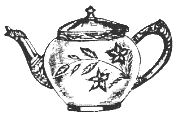Home Remedies
This page was created January 26, 2004 No item/suggestion on this page should be mistaken or used as a cure. This listing is for "informational" purposes ONLY. In looking through the several books I own regarding the use of home remedies; the thought strikesme many of our ancestors may well have died from the "cure" and not the illness. I realize that in the earlier days, theywere pretty much left to their own devices and used what worked for them. Physicians were not as centrally located as they are today and most families really couldn't afford the medicaltreatment anyway, even if they could find transportation. Many times, those physicians were not certified or licensed to practice medicinebut did it anyway to serve a community need. In watching the suffering of the family members, the parents normally resortedto whatever was available at hand--or perhaps something that their parents had used before them. The recipes for these "cures" were normally handed down through the families.. and some women also had their own recipesfor tonics and curatives. These ranged from teas to wild herbs and bark. For colds & fever, sassafras tea from the plant root was popular. They ground up mustard seed and mixed it with flour and water for a poultice used for a chest cold. Willow leaves and bark made into teas would ease pain and fever. Onions and garlic were thoughtto prevent infections and relieve high blood pressure. In the latter half of the nineteenth century, patent medicines came into being. These formulas were said to be patented by the government to give customers the impression that they would work. Sly salesmen, knowing how desperate the pioneers were for disease treatment wouldclaim that these cured everything from diptheria to typhoid. Upon closer examination though, none of these "medicines" were patented by anyone.No product labeling existed at that time and if it had, it would have revealed that the main content of those medicines was no more then flavored whiskey. Below are some comments regarding home remedies used in the past; as mentioned above, this is only for information purposes only. If all else failed to work, then use asafetida, it never cured anything, but nobody came near enough to you for you to catch anything either! Home Website Coordinator
